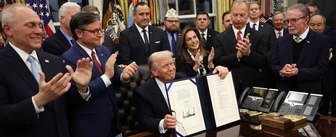Americans have a more favorable opinion of several world leaders than they do of Trump
Despite President Trump’s contentious meeting with the leaders of NATO (the North Atlantic Treaty Organization) last week, Americans in the Economist/YouGov Poll conducted over the weekend still consider Germany a friend, and by two to one hold a favorable opinion of its leader Angela Merkel. However, less than half the public thinks each leader — Merkel and Trump—respects the other.
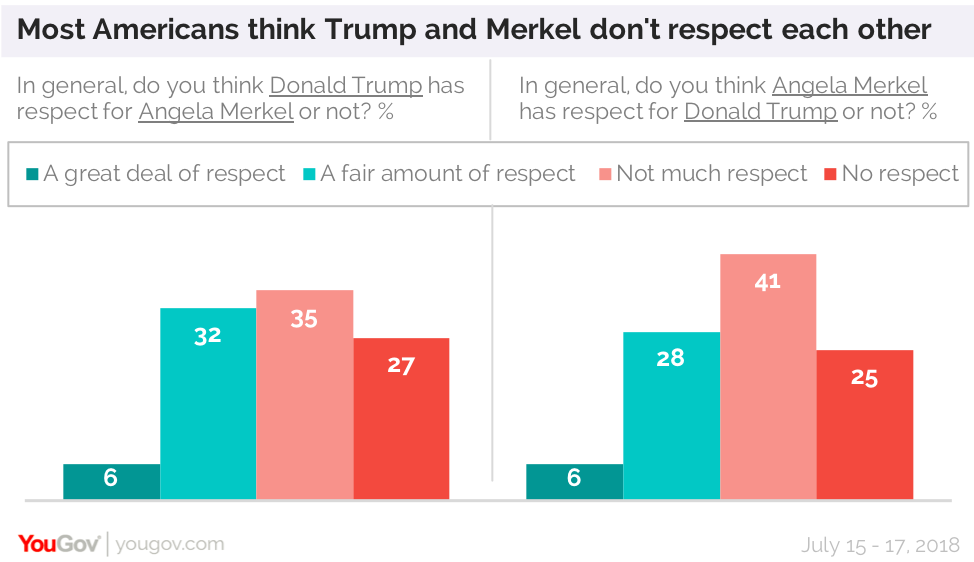
The differences in the assessment of respect between Trump and Merkel are far different from how Americans view the relationship between the US President and Russian leader Vladimir Putin. According to the public, the American President respects Putin while Putin does not respect him. [Most responses were completed before Monday’s Trump-Putin summit.]
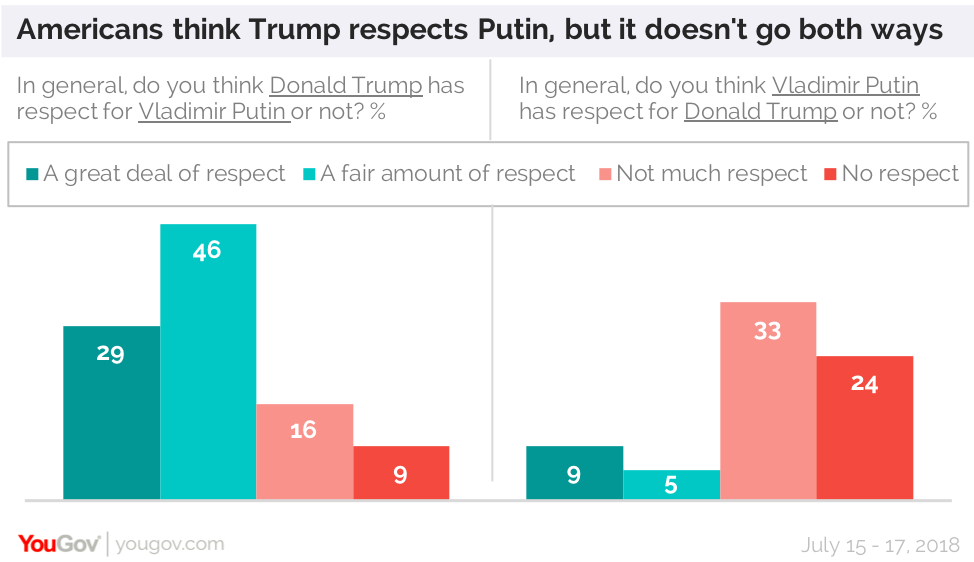
Republicans are more likely to see respect in both relationships. 63% of Republicans think President Trump has at least a fair amount of respect for Merkel, and 51% say she respects Trump. Democrats disagree on both questions. Nearly half of Democrats (45%) say the President has no respect for Merkel. On these questions, partisanship is more important than gender: women in both parties are not much different from their male counterparts on how they believe the two view each other.
As for Putin, both Republicans and Democrats believe the President respects him, while two-thirds of Republicans say Putin has at least a fair amount of respect for the American President. Three in four Democrats disagree.
The NATO leaders are quite well-liked, perhaps more popular than President Trump is with the public (although Americans may be using completely different standards when they judge foreign leaders than when they judge their own President). More than twice as many have favorable opinions of Canadian Prime Minister Justin Trudeau, French President Emmanuel Macron, British Prime Minister Theresa May, and Merkel as have unfavorable views.
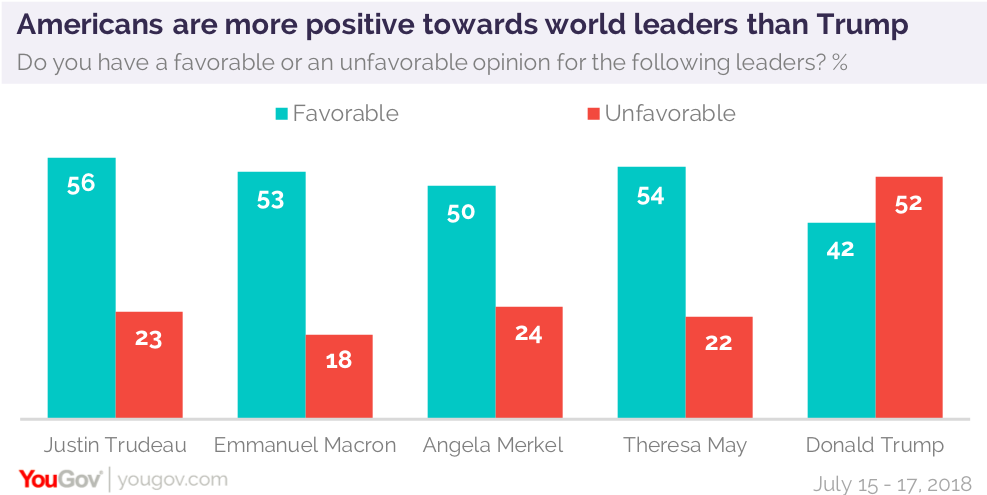
There is little indication of any major change in opinion on any of these leaders from the poll conducted the week before the NATO summit. If anything, a slightly larger percentage from last week views each leader favorably, and there has been no measurable increase in unfavorable ratings. Republicans continue to give lower ratings than Democrats do to all the foreign leaders. They are positive about Macron and May, but evenly divided in their opinions about Trudeau and Merkel.
NATO itself fares about as well as it did before the meetings: 46% this week have a favorable opinion of the organization, 26% do not. Republicans disagree, as they have before: 34% are favorable about NATO, 45% are not. However, there is little interest in leaving the alliance, or in rejecting the US commitment to defend NATO countries if attacked. By nearly eight to one, Americans believe the United States should maintain its commitment to defend any member of the alliance.
Last week, Republicans were unsure about whether the US, should remain in NATO. This week, even after the fractious meeting, more Republicans believe the US should remain in the alliance. Just 14% overall (and 21% of Republicans) think the US should withdraw.
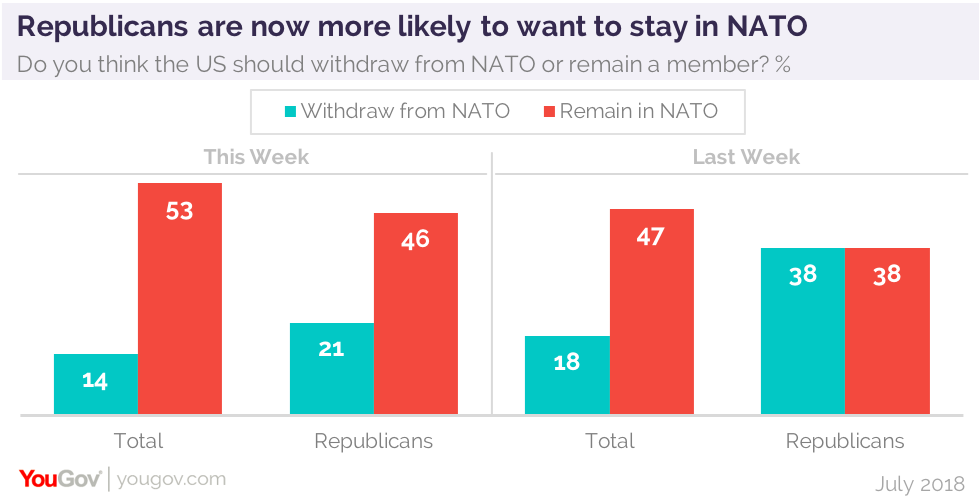
There has been — and still is — doubt about whether the President means much of what he says, and whether or not he thinks through the longer-term implications of his statements. Clearly his negative characterization of NATO (and later, the European Union) and the positive statements about Russia may in fact be ignored by many Americans. Most (52%) think he says incorrect things often. 58% of Republicans think he makes incorrect statements at least sometimes. Democrats attribute this to lying; Republicans are somewhat more likely to say it is inadvertent (as the President himself has in walking back some of his comments about Russian involvement in the 2016 election).By three to one, the public thinks Donald Trump doesn’t consider what he is saying before making statements. A majority of Republicans agree.
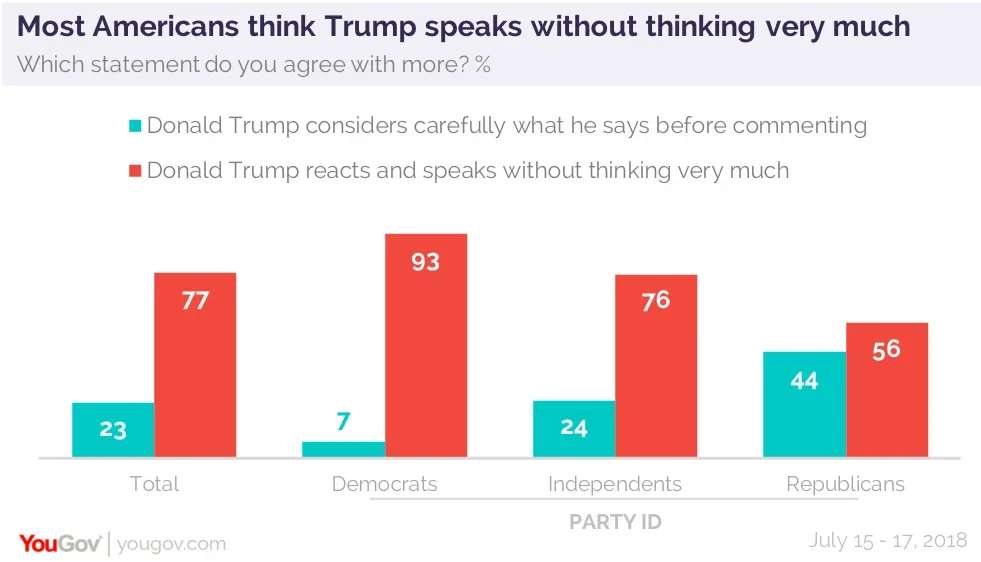
Even before the Trump-Putin summit, Americans saw a big difference in the way they evaluate Putin and how they think President Trump sees him. Most Americans regard Russia is as a serious threat (though not necessarily an immediate and very serious one). Two-thirds believe it is an unfriendly country (or even an enemy), but only half that percentage say that’s what the President believes. Seven in ten — Republicans and Democrats — have an unfavorable view of Putin. But 53% think President Trump has a favorable opinion.
That’s true for both Republicans and Democrats. 70% of Republicans have an unfavorable opinion of Putin, but half think the President has a favorable view of the Russian leader.
All in all, even before the meeting with Putin, many Americans were not happy with the President’s performance overseas. His overall approval rating changed little from the previous week (this week, 39% approve, and 50% do not), and more disapprove than approve of his handling of Germany, of NATO, of foreign trade, and of Russia.





